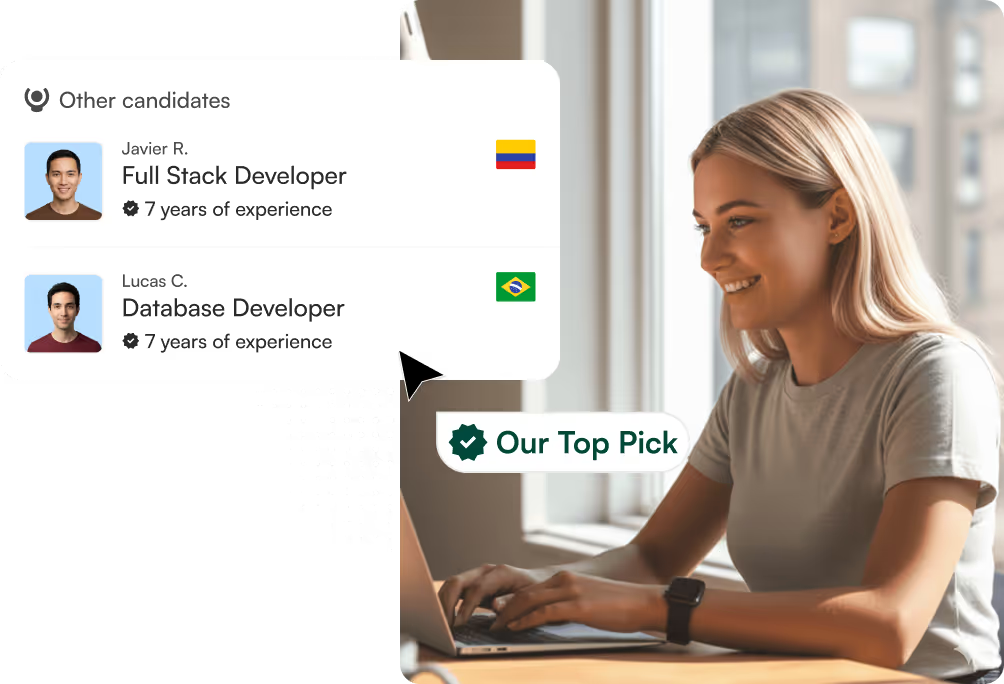40 IT Interview Questions (With Answers and Tips)


Lupa will help you hire top talent in Latin America.
Book a Free Consultation
Lupa helps you build, manage, and pay your remote team. We deliver pre-vetted candidates within a week!
Book a Free ConsultationThe IT industry continues to evolve rapidly, creating unprecedented demand for skilled IT professionals across technical roles. Whether you're preparing for your first tech interview or advancing your IT career, mastering the art of answering IT interview questions is crucial for landing your dream IT job.
IT interviews differ significantly from standard job interviews. They assess both your technical knowledge and soft skills, evaluating how you solve problems, communicate complex technical concepts, and adapt to new technology. This comprehensive guide covers the most common interview questions across technical, behavioral interview questions, and general categories to help you prepare effectively for your next job interview.
Understanding the IT Interview Process
The typical interview process for IT positions involves multiple stages, each designed to evaluate different aspects of your capabilities as an IT professional. Most companies start with a phone screening or video call to assess basic qualifications and company culture fit. This is often followed by technical assessments that may include coding challenges, system design questions, or practical troubleshooting scenarios.
The final rounds usually involve in-person or virtual interviews with team members, the hiring manager, and sometimes senior leadership. These sessions can last anywhere from one hour to a full day, depending on the role's seniority and the company's hiring process.
Different IT roles emphasize different technical skills. A software development position might focus heavily on programming languages and algorithms, while a cybersecurity role would prioritize security protocols and threat assessment. System administration interviews often include troubleshooting scenarios and infrastructure questions that test your practical know-how.
Technical IT Interview Questions
Basic Technical Knowledge Questions
These fundamental questions assess your understanding of core IT concepts and your ability to articulate technical knowledge clearly to answer questions effectively.
1. Tell me about yourself.
This classic opener allows you to set the tone for the job interview. Focus on your professional background, key achievements, and what drives your passion for information technology. Keep it concise and relevant to the IT job you're pursuing.
2. Can you explain the difference between HTTP and HTTPS?
Demonstrate your understanding of web protocols and security. Explain that HTTP transmits data in plain text, while HTTPS encrypts data using SSL/TLS protocols, ensuring secure communication between clients and servers.
3. What are the different types of IP addresses, and how do they work?
Cover IPv4 vs IPv6, public vs private addresses, and static vs dynamic assignment. Explain how IP addresses facilitate network communication and routing in system administration.
4. Describe your troubleshooting methodology when faced with a technical issue.
Outline a systematic approach: identify the problem, gather information, develop hypotheses, test solutions, implement fixes, and document the resolution. This demonstrates analytical thinking and methodical problem-solving skills essential for IT professionals.
5. What operating systems have you worked with, and which do you prefer?
Discuss your work experience with Windows, macOS, Linux, or other systems. Explain your preferences based on specific use cases and demonstrate openness to learning new technology platforms.
6. How do you ensure data backup and recovery in an organization?
Cover backup strategies (full, incremental, differential), storage locations (on-site, off-site, cloud), and recovery testing procedures. Emphasize the importance of regular testing and documentation in IT support roles.
6. Explain the concept of virtualization and its benefits.
Describe how virtualization creates multiple virtual machines on a single physical server, improving resource utilization, reducing costs, and enhancing flexibility for system administration and IT infrastructure management.
Programming and Development Questions
7. Which programming languages are you most comfortable with, and why?
Discuss your skill set in languages like Python, Java, JavaScript, SQL, or others relevant to the job description. Explain how you choose the right language for specific projects and your methodology for learning new programming languages.
8. How do you approach debugging code?
Describe systematic debugging techniques: reproducing the issue, using debugging tools, analyzing logs, implementing fixes, and testing thoroughly. Show your problem-solving methodology for identifying and resolving programming issues efficiently.
9. What is version control, and why is it important?
Explain Git or other version control systems, branching strategies, and collaborative development workflows. Demonstrate understanding of how version control supports teamwork and code management in software development environments.
10. Describe your experience with different software development methodologies.
Compare Agile, Scrum, Waterfall, or other methodologies you've used. Discuss their pros and cons and when each approach is most effective for different types of IT projects and team dynamics.
Network and Infrastructure Questions
11. How would you troubleshoot a network connectivity issue?
Walk through a systematic approach: checking physical connections, testing network layers (OSI model), using diagnostic tools (ping, traceroute, nslookup), and escalating when necessary.
12. Explain the difference between a router and a switch.
Describe how routers direct traffic between different networks while switches connect devices within the same network. Show understanding of network infrastructure components.
13. What is a firewall, and how does it enhance security?
Explain how firewalls filter network traffic based on predetermined rules, protecting systems from unauthorized access. Discuss different types (hardware, software, next-generation) and their applications.
14. Describe your experience with cloud platforms.
Discuss specific platforms (AWS, Azure, Google Cloud) and services you've used. Explain benefits like scalability, cost-effectiveness, and reduced infrastructure management overhead.
Cybersecurity Questions
15. What are the most common cybersecurity threats organizations face today?
Cover malware, phishing, ransomware, social engineering, and insider threats. Demonstrate awareness of current threat landscapes and mitigation strategies that IT professionals must understand to protect organizational assets.
16. How do you implement strong authentication in an organization?
Discuss multi-factor authentication, password policies, single sign-on solutions, and biometric authentication. Show understanding of cybersecurity best practices and the balance between security and user experience in the work environment.
17. Explain the principle of least privilege and its importance in cybersecurity.
Describe how limiting user access to only necessary resources reduces security risks. Discuss implementation strategies and regular access reviews as part of comprehensive IT security methodology.
Behavioral IT Interview Questions
Problem-Solving and Troubleshooting Questions
18. Describe a time when you solved a complex technical problem with limited resources.
Use the STAR method (Situation, Task, Action, Result) to structure your answer. Highlight your analytical skills, creativity, and ability to work with constraints while maintaining quality standards in your IT work.
19. Tell me about a time when you couldn't fix a problem. What steps did you take?
Show humility and learning mindset when you answer questions like this. Describe how you documented the issue, sought help from colleagues or online resources, and what you learned from the experience to improve your technical knowledge.
20. How do you prioritize multiple technical issues when everything seems urgent and you're facing tight deadlines?
Demonstrate your ability to assess impact and urgency, communicate with stakeholders, and manage expectations while working systematically through problems. Show your time management and decision-making skills under pressure.
Teamwork and Collaboration Questions
21. Describe a project where you had to work closely with non-technical stakeholders.
Show your communication skills and ability to translate technical concepts into business terms. Highlight successful outcomes and relationship management that demonstrate your value as a good fit for cross-functional team collaboration.
22. How do you handle conflicts within your technical team while maintaining teamwork?
Demonstrate emotional intelligence, conflict resolution skills, and professional communication. Show how you maintain team cohesion while addressing disagreements constructively in challenging work environments.
23. Give an example of when you had to lead a technical project or manage team members.
Highlight leadership qualities, project management skills, and ability to motivate team members while delivering technical objectives. Show your adaptability in taking on leadership responsibilities when needed.
Adaptability and Learning Questions
24. Describe a time when you had to quickly learn new technology for a project.
Show your learning methodology, resourcefulness, and ability to apply new technical knowledge effectively. Demonstrate comfort with continuous learning in the IT industry where technology evolves rapidly.
25. How do you stay current with technology trends and IT industry developments?
Discuss specific resources (technical blogs, certifications, conferences, online courses) and how you evaluate which trends are worth pursuing for your career path and professional development.
26. Tell me about a time when a technology you were using became obsolete.
Show adaptability and forward-thinking. Describe how you managed the transition, developed new IT skills, and prepared for future technological changes that impact IT professionals across the industry.
General IT Career Questions
Career Motivation and Goals Questions
27. Why did you choose a career path in information technology?
Share your genuine interest in technology, problem-solving, and continuous learning. Connect your personal motivations with professional goals and explain how the IT industry aligns with your strengths and interests.
28. Where do you see your IT career heading in the next five years?
Demonstrate ambition balanced with realistic expectations. Show how your goals align with potential growth opportunities at the company and how you plan to develop your IT skills and technical expertise.
29. What aspects of IT work do you find most challenging and rewarding in your work experience?
Show self-awareness and genuine engagement with the IT field. Balance challenges with positive aspects and growth opportunities, demonstrating your understanding of what makes IT professionals successful.
Company and Role-Specific Questions
30. What do you know about our company's technology stack and products?
Demonstrate research and genuine interest. Connect your IT skills and work experience to the company's specific technical needs and challenges outlined in the job description. Show how you can be a good fit for their team.
31. How would you contribute to our team's technical objectives as an IT professional?
Show understanding of the role requirements and how your experience addresses their needs. Demonstrate enthusiasm for collaboration and shared success while highlighting your relevant technical skills and problem-solving abilities.
32. What questions do you have about our work environment and team structure?
Prepare thoughtful questions about team dynamics, professional development opportunities, and technical challenges they're facing. This demonstrates your serious interest in the IT job and helps you evaluate the company culture fit.
Additional Essential Questions
33. How do you approach documentation and knowledge sharing within your team?
Emphasize the importance of clear documentation for troubleshooting, teamwork, and knowledge transfer. Show commitment to helping team members succeed and supporting effective IT support processes.
34. Describe your experience with automation tools and processes.
Discuss specific automation experience, tools used, and benefits achieved. Show understanding of how automation improves efficiency, reduces errors, and enhances overall IT operations and system administration.
35. How do you handle working under tight deadlines while maintaining quality in your technical deliverables?
Demonstrate time management skills, ability to prioritize tasks, and strategies for maintaining high standards under pressure. Show your adaptability and problem-solving approach when facing challenging work environments.
36. What certifications do you currently hold, and which ones are you planning to pursue?
Show commitment to professional development and staying current with IT industry standards. Connect certifications to career goals, job requirements, and how they enhance your skill set and technical knowledge.
37. How do you ensure the security of systems and data you work with in your daily IT support activities?
Demonstrate security mindset, awareness of best practices, and understanding of compliance requirements relevant to the IT job. Show how you integrate cybersecurity considerations into routine IT tasks.
38. Describe your experience with project management tools and methodologies.
Show organizational skills and ability to work within structured environments. Discuss specific tools and how they improve project outcomes, facilitate teamwork, and support effective communication with stakeholders.
39. How do you approach mentoring junior team members or entry-level IT professionals?
Demonstrate leadership potential and commitment to team growth. Show patience, clear communication skills, and knowledge transfer abilities that benefit the broader IT team and company culture.
40. What do you consider the most important qualities for success in an IT role?
Synthesize key attributes: technical competence, continuous learning, problem-solving ability, communication skills, adaptability to new technology, and teamwork. Show understanding of what makes IT professionals valuable contributors to their organizations.
What Employers Look for in IT Candidates
Beyond technical proficiency, employers and recruiters seek IT professionals who demonstrate strong problem-solving abilities, excellent communication skills, and the adaptability to learn new technology quickly. The ability to explain complex technical concepts to non-technical stakeholders is particularly valued, as IT professionals often work with business teams across the organization.
Company culture fit has become increasingly important in the hiring process. Employers want team members who align with their values, demonstrate strong teamwork, and contribute positively to the work environment. Demonstrating a growth mindset and continuous learning approach signals to hiring managers that you'll stay current with evolving technologies and methodologies.
Hiring managers also assess your ability to work under pressure, manage tight deadlines, and maintain attention to detail while handling multiple projects simultaneously. These soft skills are essential for success in fast-paced IT environments where entry-level professionals and experienced professionals alike must deliver quality results consistently.
How to Prepare for IT Interview Questions
Successful preparation goes beyond memorizing common interview questions. Start by thoroughly reviewing the job description and researching the company's technology stack, recent projects, and IT industry challenges. This knowledge helps you tailor your responses and ask intelligent questions that demonstrate genuine interest.
Practice explaining technical concepts to non-technical audiences. Many IT jobs require interfacing with business stakeholders who need clear, jargon-free explanations of technical solutions and challenges. This communication skill is increasingly valued by hiring managers and recruiters.
Create a personal inventory of your work experience, projects, and achievements. Prepare specific examples that demonstrate key IT skills like problem-solving, leadership, technical expertise, and adaptability. Use the STAR method to structure these stories for maximum impact when you answer questions during the job interview.
Stay current with IT industry trends and be prepared to discuss how emerging technologies might impact the role or company. This shows forward-thinking and genuine interest in the field's evolution, particularly important for entry-level candidates looking to demonstrate growth potential.
Research the company culture and values to understand what type of candidate would be a good fit. Review their LinkedIn presence, recent announcements, and employee testimonials to gain insights into their work environment and team dynamics.
Expert Tips for Answering IT Interview Questions
When discussing technical topics, balance depth with clarity. Provide enough detail to demonstrate expertise without overwhelming the interviewer. Always be prepared to go deeper if they ask follow-up questions about your technical knowledge or specific technical skills.
For problem-solving questions, walk through your thought process step-by-step. Interviewers want to understand how you approach challenges, not just the final solution. Show systematic thinking and consideration of multiple factors when you answer questions about troubleshooting or complex technical issues.
When you don't know how to answer questions, be honest but show how you would find the solution. Describe your research methodology, resources you would consult, and how you would validate your findings. This demonstrates intellectual honesty and learning ability that hiring managers value in IT professionals.
Use specific examples from your work experience whenever possible. Instead of saying "I'm good at troubleshooting," describe a specific situation where your troubleshooting skills solved a critical problem in your previous IT job. Concrete examples are more memorable and credible to recruiters and hiring managers.
Demonstrate soft skills throughout the tech interview process. Show your communication skills, teamwork abilities, and adaptability while discussing technical topics. These qualities often distinguish strong candidates in the competitive IT job market.
Questions to Ask the Interviewer
Prepare thoughtful questions that demonstrate your interest in the IT job and help you evaluate the opportunity as a good fit for your career path:
- "What are the biggest technical challenges your IT team is currently facing?"
- "How does the team stay current with new technology and IT industry trends?"
- "What opportunities exist for professional development and advancing technical skills?"
- "How do you measure success in this IT role?"
- "What does a typical project management lifecycle look like here?"
- "How does the IT department collaborate with other stakeholders across the organization?"
- "What emerging technologies is the company exploring or planning to adopt?"
- "Can you describe the company culture and work environment for IT professionals?"
- "What automation tools and methodologies does the team currently use?"
- "How do you support career path development for team members in IT jobs?"
These questions show engagement with the interview process and help you assess whether the role aligns with your career goals, technical interests, and preferred work environment. They also demonstrate your understanding of what makes IT professionals successful in different organizational contexts.
Conclusion
Mastering IT interview questions requires a combination of technical knowledge, clear communication, and genuine enthusiasm for technology and problem-solving. The questions covered in this guide represent the core areas most IT interviews explore, from fundamental technical concepts to behavioral scenarios and career motivations.
Remember that successful interviews are conversations, not interrogations. While preparation is essential, authenticity and genuine engagement with the interviewer often make the strongest impression. Use these questions as a foundation for preparation, but be ready to adapt your responses based on the specific role, company, and interviewer's style.
Ready to advance your IT career with premium opportunities?
At Lupa, we connect exceptional LatAm IT professionals with leading companies that value quality and expertise. Our strategic approach to matching goes beyond skills to ensure cultural fit and long-term success. Whether you're seeking your next technical challenge or looking to join a team that appreciates premium talent, book a discovery call and let's build your dream career path together.

"Over the course of 2024, we successfully hired 9 exceptional team members through Lupa, spanning mid-level to senior roles. The quality of talent has been outstanding, and we’ve been able to achieve payroll cost savings while bringing great professionals onto our team. We're very happy with the consultation and attention they've provided us."


“We needed to scale a new team quickly - with top talent. Lupa helped us build a great process, delivered great candidates quickly, and had impeccable service”


“With Lupa, we rebuilt our entire tech team in less than a month. We’re spending half as much on talent. Ten out of ten”






















